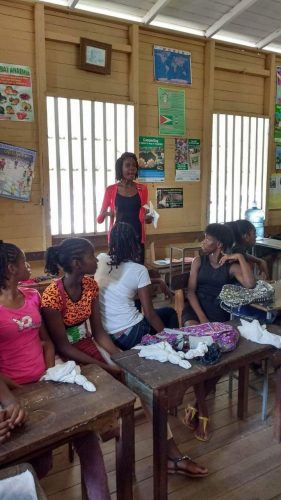Empowering Young Minds, an organisation dedicated to mental health and youth empowerment since 2016, is making significant strides in community support. With a focus on enhancing the well-being of young individuals, the organisation provides resources and programmes aimed at fostering resilience and self-confidence, its Chairman June Ann Payne has said.
In an email interview with this newspaper, Payne said that by addressing various social, emotional, and educational challenges faced by youth, Empowering Young Minds aims to create a supportive environment where young people can thrive.
Through workshops and mentoring programmes, she said, Empowering Young Minds equips youth with essential skills to navigate life’s challenges. This approach not only empowers individuals but also strengthens community ties, allowing for a collective effort in addressing issues such as mental health and youth disconnection. The organisation actively collaborates with local stakeholders to ensure that resources are accessible and tailored to the specific needs of the communities it serves.

The registered non-governmental organisation is headed by seven executive members who work assiduously to help promote better communities through workshops and counselling.
Payne, who worked with the mental health unit, specifically at the Canjie Hospital since 2019, shared that many mental health issues arise from societal factors rather than genetics. These social stressors include financial stress and environmental influences. She therefore learned to emphasise the importance of addressing social determinants.
Empowering Young Minds’ commitment to fostering a culture of support and understanding remains unwavering, Payne said. By prioritising mental health education and community involvement, the organisation is paving the way for a brighter future for young people, encouraging them to realise their potential and contribute positively to society. Through these efforts, Payne said, she believes that the organisation is not just addressing immediate concerns but also laying

the foundation for long-term change within the community.
Payne also advocates for teaching coping skills and resilience to prevent anxiety and depression, recognizing that unresolved issues can escalate into severe mental health problems. Her hands-on experience with patient reintegration, she said, informed her belief in the necessity of community education about mental health and substance use, to reduce stigma and promote proactive support.
The organisation’s simplified approach to mental health focuses on several key components, Payne said. It teaches communities coping mechanisms and resilience-building strategies to help individuals manage stressors effectively; addresses the risks associated with substance use, aiming to educate youth about its biological, psychological, and social effects; promotes active community participation, fostering supportive environments where individuals can share experiences and seek help; and prioritises early intervention and prevention to mitigate the escalation of mental health issues.
Payne told this newspaper that she has extended a call to the Government of Guyana for the appointment of a community development officer in the Charlestown and South Georgetown areas to tackle various local issues. This officer would be specifically assigned to communities and with an aim to provide direct support and liaison services to residents.
Meanwhile, Empowering Young Minds has formed several strategic partnerships. Payne noted that collaborations with local organisations, schools, and mental health services would create a network of resources that address the diverse needs of young people. One notable partnership is with the Citizen Security Programme, which addresses minor crimes committed by young people. This collaboration not only provides rehabilitative support but also fosters a sense of community responsibility among youth. By engaging local law enforcement and community leaders, Empowering Young Minds helps create a safer environment while empowering young individuals to make positive choices.
Payne shared a story about a young man who faced challenges during a job recruitment event due to his unkempt appearance. She emphasised that a community officer could have intervened effectively, providing the necessary support to help him navigate such situations. This, she said, underscored the importance of having someone within the community who understands and can address these challenges.
In addition, Payne said, Empowering Young Minds is taking significant steps to integrate support for women who lack assistance in abusive relationships. She said that the organisation recognises the profound impact that domestic abuse can have on mental health and overall well-being, and aims to create a safe space for these women. By establishing partnerships with local shelters and counselling services, Empowering Young Minds plans to provide resources such as legal aid, emotional support, and access to safe housing.
Through community outreach programmes, she said, the organisation intends to raise awareness about the signs of abuse and the importance of seeking help. Workshops will be organised to educate women on their rights and available resources, she added, empowering them to make informed decisions about their futures. Additionally, peer support groups will be established, allowing women to share their experiences and foster a sense of community among those facing similar challenges.





